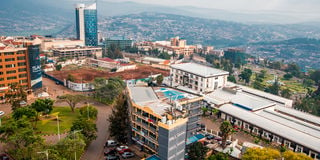Premium
‘Tiny’ Rwanda and Kenyan tribesmen

Kigali skyline. Why, then, wouldn’t the Tanzania and Ugandan media edit the wire copy to say simply Rwanda, “neighbour Rwanda”, and remove the “tiny” bit?
On Tuesday, newspapers in Tanzania and Uganda carried wire stories describing Rwanda as a “tiny East African” country.
It’s a common occurrence in our region’s national dailies. Kenya media regularly publish wire stories referring to Uganda and Tanzania too as “the East African country”.
Frequently, you will read references to Uganda’s President Yoweri Museveni, Kenya’s William Ruto and Rwanda’s Paul Kagame as “the African president”.
Technically, they are correct, but they violate the basic laws of proximity and familiarity.
It would be understandable if an American or British newspaper had that description, indicating a country that is far away on another continent, but it’s strange in this case because Rwanda is a neighbour of both Tanzania and Uganda.
It is the same reason most reasonable people wouldn’t refer to “my father’s wife/ex-wife” instead of “my mother”.
A sober Daily Nation would not refer to the Kikuyu or Kamba people “of Kenya”. It would be equally strange for The Citizen, Tanzania, to refer to the “Haya (Bahaya) of Tanzania”. It wouldn’t be odd if The New York Times or Premium Times of Nigeria did.
Why, then, wouldn’t the Tanzania and Ugandan media edit the wire copy to say simply Rwanda, “neighbour Rwanda”, and remove the “tiny” bit? One reason is that there’s a blind spot that develops over time, so your senses are perked up enough to catch the problem.
Many years ago, I was in a place that had a poster about the coal industry in the UK on the wall. The headline on it said “Coal Made Britain Great”.
It was only when I was leaving that I realised that I had been reading it wrong. For months, I had seen “Coal Made Great Britain”.
The other could be intellectual laziness. Some journalists, pressed for deadline, won’t be bothered to put in the extra effort to make those fine changes. Mostly, however, it illustrates how much a Western-centric view of the world remains entrenched in African thought and perspectives.
Over the years, East African (and African) newspapers have published Western wire stories and maintained a reference to neighbouring countries as “poverty-stricken”. It might make sense in a story about people going hungry, or being homeless, but no, it is in a story about the start of an international conference in the capital.
Last year, a wire story published on the same day in a Kenyan and a Ugandan daily referred to Uhuru Kenyatta’s and Raila Odinga’s “Kikuyu and Luo tribesmen”. Our media still happily run stories about barefoot children with “distended stomachs” running about in a slum or village.
Forty years ago, this information crime led to a clamour for a “new world information order”. In nearly all the East African countries, there are about 10 times more universities than there were then, and therefore, as many more graduates. The world has opened up and knowledge has become dramatically more accessible, thanks to the internet.
You would imagine, then, that there would be a bigger mass of African knowledge and thinkers to definitively push out old prejudiced perspectives. However, outside cultural and artistic spaces, that isn’t the case. Western perspectives are more entrenched in many areas of African knowledge work than before.
The internet has been a double-edged sword. While it has unlocked and made available an incredible amount of knowledge, comparatively little of it is African. African content online is still only above two per cent of the global total. There is more content on the web about the French capital Paris than all of Africa combined.
China and the so-called “rise of the East” has complicated matters further. It has muscled strongly on the web to insert its worldview. What would have been a straight Africa-versus-the West contest became muddied with the East inserting itself as a third force. It not only marginalised Africa further but also captured a lot of its attention.
Anyone who is in a WhatsApp group that is not about a funeral or wedding will have witnessed furious debates about whether China is a better partner than the West for Africa. The debate will drag on for three weeks.
A debate about an African topic, however, will die out after two days. I witnessed clever Africans on WhatsApp debating whether a Brics currency would replace the dollar as the primary medium of global trade for three months ahead of the bloc’s meeting in South Africa in August.
Petty nationalist rivalries also play a role. As on social media, mainstream media in East Africa frequently put down one another. Referring to “tiny” Rwanda while accurate about the relative size of the country is also to belittle it. It’s to diminish a competitor.
Otherwise, they would regularly refer to Kenya as “medium size” or Tanzania as “fairly big”, but they don’t.
Sometimes, the result can be truly bizarre. Not too long ago, a Ugandan newspaper carried a wire story that referred to Kenya as “a former British colony”. When I last checked, Uganda, too, was still a former British colony.
- Mr Onyango-Obbo is a journalist, writer and curator of the “Wall of Great Africans”. @cobbo3





